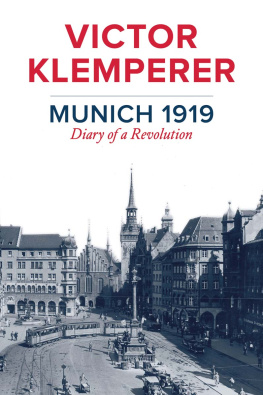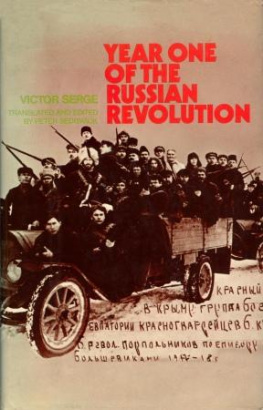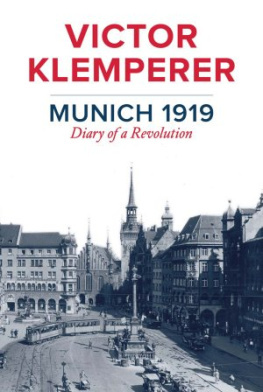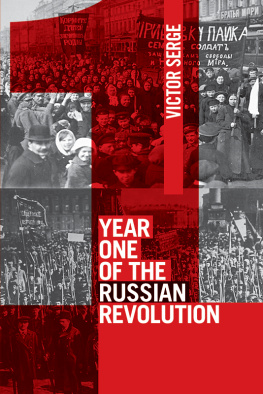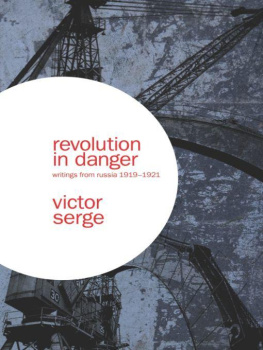Klemperer Victor - Munich 1919: diary of a revolution
Here you can read online Klemperer Victor - Munich 1919: diary of a revolution full text of the book (entire story) in english for free. Download pdf and epub, get meaning, cover and reviews about this ebook. City: Bavaria (Germany);Germany;Bavaria;Munich;Munich (Germany, year: 2017, publisher: Polity Press, genre: Art. Description of the work, (preface) as well as reviews are available. Best literature library LitArk.com created for fans of good reading and offers a wide selection of genres:
Romance novel
Science fiction
Adventure
Detective
Science
History
Home and family
Prose
Art
Politics
Computer
Non-fiction
Religion
Business
Children
Humor
Choose a favorite category and find really read worthwhile books. Enjoy immersion in the world of imagination, feel the emotions of the characters or learn something new for yourself, make an fascinating discovery.
- Book:Munich 1919: diary of a revolution
- Author:
- Publisher:Polity Press
- Genre:
- Year:2017
- City:Bavaria (Germany);Germany;Bavaria;Munich;Munich (Germany
- Rating:4 / 5
- Favourites:Add to favourites
- Your mark:
- 80
- 1
- 2
- 3
- 4
- 5
Munich 1919: diary of a revolution: summary, description and annotation
We offer to read an annotation, description, summary or preface (depends on what the author of the book "Munich 1919: diary of a revolution" wrote himself). If you haven't found the necessary information about the book — write in the comments, we will try to find it.
Munich 1919: diary of a revolution — read online for free the complete book (whole text) full work
Below is the text of the book, divided by pages. System saving the place of the last page read, allows you to conveniently read the book "Munich 1919: diary of a revolution" online for free, without having to search again every time where you left off. Put a bookmark, and you can go to the page where you finished reading at any time.
Font size:
Interval:
Bookmark:


The first page of the manuscript of Klemperers 1942 memoirs on the Revolution of 191819.
Munich 1919
With a foreword by Christopher Clark and a historical essay by Wolfram Wette
Translated by Jessica Spengler
polity
First published in German as Man mchte immer weinen und lachen in einem. Revolutionstagebuch 1919 Aufbau Verlag GmbH & Co. KG, Berlin 2015

This English edition Polity Press, 2017
The translation of this work was supported by a grant from the Goethe-Institut which is funded by the German Ministry of Foreign Affairs.
Polity Press
65 Bridge Street
Cambridge CB2 1UR, UK
Polity Press
350 Main Street
Malden, MA 02148, USA
All rights reserved. Except for the quotation of short passages for the purpose of criticism and review, no part of this publication may be reproduced, stored in a retrieval system or transmitted, in any form or by any means, electronic, mechanical, photocopying, recording or otherwise, without the prior permission of the publisher.
ISBN-13: 978-1-5095-1062-7
A catalogue record for this book is available from the British Library.
Library of Congress Cataloging-in-Publication Data
Names: Klemperer, Victor, 1881-1960, author.
Title: Munich 1919 : diary of a revolution / Victor Klemperer.
Other titles: Man mochte immer weinen und lachen in einem. English
Description: English edition. | Cambridge, UK ; Malden, MA : Polity, 2017. | First published in German as Man mochte immer weinen und lachen in einem: Revolutionstagebuch 1919. | Includes bibliographical references and index.
Identifiers: LCCN 2016048318 (print) | LCCN 2016055458 (ebook) | ISBN 9781509510580 (hardback) | ISBN 9781509510610 (Mobi) | ISBN 9781509510627 (Epub)
Subjects: LCSH: Klemperer, Victor, 1881-1960--Diaries. | Bavaria (Germany)--History--Revolution, 1918-1919--Sources. | Munich (Germany)--History--20th century--Sources. | Young men--Germany--Munich--Diaries. | Philologists--Germany--Munich--Diaries. | Jews--Germany--Munich--Diaries.
Classification: LCC PC2064.K5 A3 2017 (print) | LCC PC2064.K5 (ebook) | DDC 943.085092 [B] --dc23
LC record available at https://lccn.loc.gov/2016048318
The publisher has used its best endeavours to ensure that the URLs for external websites referred to in this book are correct and active at the time of going to press. However, the publisher has no responsibility for the websites and can make no guarantee that a site will remain live or that the content is or will remain appropriate.
Every effort has been made to trace all copyright holders, but if any have been inadvertently overlooked the publisher will be pleased to include any necessary credits in any subsequent reprint or edition.
For further information on Polity, visit our website: politybooks.com
Christopher Clark
The wave of political tumult and revolution that crashed over Germany at the end of World War I was a key episode in twentieth-century history. A society already scarred by war and defeat found itself once again shaken to its very foundations. The emergence of a Soviet-style communist Left on the one hand and heavily armed, counter-revolutionary right-wing radical groups on the other led to drastic political polarization. The rhetorical escalation soon degenerated into violence. Freikorps troops clashed fiercely with Spartacists.
Nowhere was the expansion of the conventional political spectrum more dramatic than in Munich. On November 7, 1918, the King of Bavaria became the first German monarch to be toppled. The army defected to the revolutionaries and the king went into exile. After the Bavarian prime minister Kurt Eisner (Independent Social Democratic Party) was assassinated on February 21, 1919, the power struggle between left-wing and moderate socialists came to a head. The government of the new prime minister, Johannes Hoffmann (Social Democratic Party), was overthrown on April 7 and replaced with a Bavarian council republic led initially by pacifist and anarchist intellectuals. But barely a week later, the communists under Eugen Levin seized power. Hoffmanns cabinet, which had gone into exile, now asked the government in Berlin for help. In mid-April, Reichswehr troops and Freikorps units advanced on the Bavarian revolutionaries. The council republic was then brutally crushed, and an estimated 2,000 of its supporters both actual and merely alleged were murdered, summarily shot or sentenced to imprisonment.
Victor Klemperer guides us through the turmoil of these eventful Munich days with empathy, sensitivity, and a perceptive eye. This volume brings together contemporary accounts written for the Leipziger Neueste Nachrichten newspaper, only a fraction of which were published at the time, as well as related passages from a later memoir that Klemperer was forced to abandon in 1942. Thanks to the diaries he kept during the Third Reich, Victor Klemperer is one of the most frequently read eyewitnesses of the twentieth century. The keen judgment, eye for striking details, and literary talent he displays in that epic chronicle are also evident in the writings of the young Romance philologist in Munich who was concerned about his academic future.
This is Klemperer describing the entrance of the troops that crushed the council republic in the Bavarian capital in early May 1919:
all through the day and late into the afternoon, as I write these lines, a thunderous battle has raged. An entire squadron of planes is crisscrossing Munich, directing fire, drawing fire itself, dropping flares; bombs and grenades blast constantly, sometimes farther away, sometimes nearer, shaking the houses, and a torrent of machine-gun fire follows the explosions, with infantry fire rattling in between. And all the while new troops march, drive, ride down Ludwigstrasse with mortars, artillery, forage wagons and field kitchens, sometimes accompanied by music, and a medical train has stopped at the Siegestor, and heavy patrols and various weapons divisions are scattering through the streets, and crowds of people form on every corner that provides cover but also a view, often with opera glasses in their hands.
The readers attention is drawn dynamically from the airplanes above to the masses of troops below; our gaze sweeps over the multitude of weapons, people, and vehicles, coming to rest on the clusters of bystanders taking in the spectacle through opera glasses. Klemperer memorably conveys the theatricality of the political events, the element of drama about them. In fact, he considers this a defining characteristic of the Munich revolution: In other revolutions, in other times, in other places, he writes in early February 1919, the leaders have come from the streets, from the factories, from the typing pools of editorial and law offices. In Munich, many of them have come from the bohemian world. Under these circumstances, politics appears to be not a profession but rather a stage upon which dreams (and nightmares) are played out. Im a visionary, a dreamer, a poet! the prime minister Kurt Eisner cries out to a large assembly in the Hotel Trefler. Klemperer looks on in astonishment as Eisner a delicate, tiny, frail, stooped little man in his eyes elicits clamorous applause from the Munich audience, and he infers that the people of Munich are less interested in politics than in entertainment.
Font size:
Interval:
Bookmark:
Similar books «Munich 1919: diary of a revolution»
Look at similar books to Munich 1919: diary of a revolution. We have selected literature similar in name and meaning in the hope of providing readers with more options to find new, interesting, not yet read works.
Discussion, reviews of the book Munich 1919: diary of a revolution and just readers' own opinions. Leave your comments, write what you think about the work, its meaning or the main characters. Specify what exactly you liked and what you didn't like, and why you think so.

